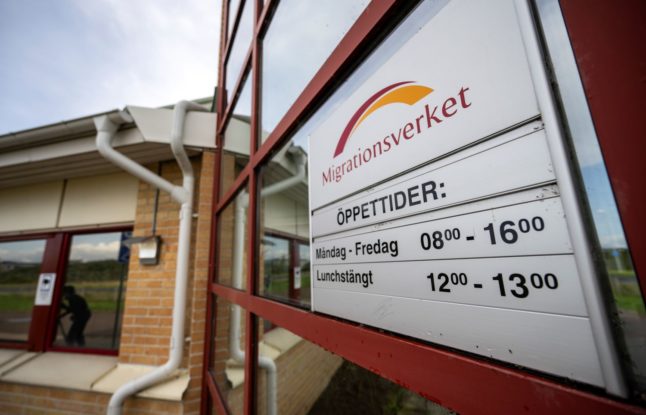“They were like, 'You're coming home? Great!'” the Australian laughs.
He says it's in his nature to approach a difficult situation with humour, and the situation he's found himself in now is frustrating, but far from unique. He is one of the many foreign professionals who have been ordered to leave Sweden due to administrative problems with his work permit.
He will be speaking at an event in WeWork, central Stockholm on Friday evening, which he organized with StartupGrind and Diversify Foundation, along with others, to highlight an issue which he says many people are not aware of or believe has already been fixed. The idea to set up the event was a “knee-jerk” reaction after getting his third rejection, and several hundred people have shown interest in it, with little need for promotion.
From 2015 onwards, hundreds of international skilled professionals have received deportation orders after work permit rejections, many times due to minor administrative errors, which in some cases were made by a former employer and in others had already been fixed. The problem even led to the introduction of a new word to the Swedish language: kompetensutvisning or 'deportation of talent'.
Legislation passed in 2017 means that permits should not be rejected if action taken to correct a mistake before it was pointed out by the Migration Agency. And judgments from the Migration Supreme Court have set a precedent that decisions should be based on an overall assessment of factors (or helhetsbedömning), meaning that one minor mistake should not derail an otherwise good application.
But despite these measures, work permit rejections over minor mistakes are still happening, and not only to Bhaga.
READ ALSO:
Sweden plans to introduce a new so-called 'talent visa' from 2021. But the details have not yet been clarified, and this will not help the highly skilled workers who have already made the move to Sweden.
The Australian highlights the discrepancy between the lack of options for those affected by kompetensutvisning, and the work Stockholm and Sweden are doing to try to attract international professionals to plug the country's skills shortage.
“It's great for the new people coming in; the government is aware of what's been going on and trying to fix it. But what about the talent we already have here in Sweden? Companies have spent money on these people, the government has spent taxpayer money,” he notes.
And of course, for those affected, the issue is a personal one. After six years in Stockholm, Bhaga has put down roots. He has an apartment and a mortgage, friends and a professional network, as well as volunteering with various events and in the startup community.
“I love living here and a lot of other migrants do too. So we want to make it easier for people to enjoy it and not have to go through this; people like us can be brand advocates of Sweden,” says the business developer. “We need to be keeping and developing these people, and reducing the impact that this systemic issue has on their lives.”
“It's not about a blame game or singling out one politician or authority. Everything has its faults; people are slipping through the cracks, so we need to work out how to deal with it. We need to at least bring this topic back into the light and talk about how to fix it.”
READ ALSO: 'I'm being deported for finding my Swedish job on LinkedIn'
There is no specific list of outcomes Bhaga and the others behind the event are asking for, but measures he thinks could help include education for employees and employers, as well as a more streamlined process.
“We want to raise awareness that this is still going on and get people talking about it and about possible solutions.”
“When I was going through the work permit process with a startup, both myself and the HR person were trying to follow the law but didn't understand it. This was three years ago. We had to call Migrationsverket three or four times and got different answers every time, so that seems like a system fix that we can work on.”
Bhaga first arrived in 2013 for a job with Electrolux, before moving into the startup world, and he currently works as a business developer for H&M. But the past three years have been spent in back-and-forth with the Migration Agency and the Courts, and in total he has received three deportation orders after a work permit extension and two subsequent appeals were rejected.
In his case, the problem with his initial permit extension was that one of his jobs was advertised on LinkedIn and not via the Swedish Public Employment Agency (a requirement of all jobs offered to non-EU nationals).
Bhaga appealed this decision, referencing Supreme Court judgments on similar cases, but received another rejection. He was also told that another job had not met the necessary criteria, because he was working for a startup that was a subsidiary of the head company named on his work permit.
“There was a lot of time in between each rejection, and I was calling the authorities every week to ask what was going on. That's another fault in the system; as the person in the process, you don't know anything until you finally get the decision by post. The humane side is being missed out,” he says.
Both times, the reasons for rejection related to jobs he had since left, and he believes that the principle of helhetsbedömning has not been applied throughout the entire system. Though he has lived and worked in Sweden for over five years, currently he is not eligible for a permanent residence permit because of the Migration Agency's judgment that he has not been in Sweden legally for all of that time.
He received his final rejection in October 2019, and has been ordered to leave the country by November 5th.
For Bhaga, the worst part of the process is the sense that you're alone and helpless in this situation, and he hopes that Friday's event will show others in his situation that they do have support.
“Both Swedes and internationals care about this issue, even if Swedes I speak to don't always know it's happening, they're shocked when I talk about it; it's a problem for people in corporates and in startups, so you're not alone. It's about getting the right people in the room, not pointing fingers but saying 'hey, this is a problem, what can we do?'”
“A really good thing about Sweden is that we are able to have these conversations and just to talk freely about things, even if they're uncomfortable, and that's very cool,” he says.
Click here to find out more about the #KeepTheTalent event on Friday, October 25th.
Have you been affected by work permit problems? If you'd like to share your experience, you can get in touch with The Local any time.



 Please whitelist us to continue reading.
Please whitelist us to continue reading.
Member comments